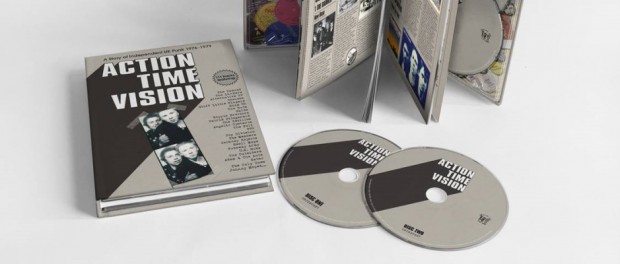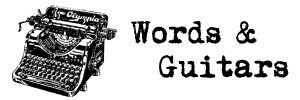Various – Action Time Vision: a Story of Independent UK Punk 1976-1979

One of the – many – narratives to emerge from the late 70s British punk movement was the notion of ‘do-it-yourself’, of self-reliance, and a distancing from traditional channels of distribution and expression. Exemplified by the rise of fanzine culture, the charity shop dress code and the emergence of a thriving independent record label scene, the latter is rather well curated here in an exhausting 4 CD, 111 track set that includes some big names (The Damned, Joy Division, The Fall) but mainly features acts who perhaps vomited up a few singles at best, and then disappeared back to the council estates from which they had sprung.
Independent labels weren’t completely new of course; setting up a label (primarily to make some money) had a pretty long history. But for the acts themselves to save up and get a 7″ pressed, or for someone to want to document local bands, it seemed like a radical notion, taken to its logical end when Scritti Politti issued a ‘how to’ booklet in the downtime between their own releases.
What Action Time Vision illustrates is the sound of nascent British punk rock – and it’s not always pretty. Some of the main players on the scene complained about an emerging conformity to the new bands – and that’s true to an extent. The format quickly coalesced around the sound of hastily scrubbed guitars, biscuit tin drums and adenoidal – or sometimes effeminate – vocals; there’s little of the Sex Pistols’ meaty mod riffs or The Damned’s blitzkreig of drums and dive-bombing fret play here. Instead, the amateur sound of young Britain sat closest to Buzzcocks’ amphetamine pop, although tempered by an occasional yobbish snarl. The best of the bunch (999’s ‘I’m Alive’, The Snivelling Shits’ ‘Terminal Stupid’) marry the urgency and cynism of the era with catchy hooks and offered hope to those inspired to pick up guitars and drum sticks for the first time.
Yet it’s easy to overplay the uniformity card, as the choppy rhythms of Swell Maps’ ‘Read About Seymour’ or Patrick Fitzgerald’s ‘one man and his acoustic’ prove. (The thread that connects, for example, The Lurkers’ ‘Shadow’, with its out-of-tune guitars, to The Fall’s ‘Psycho Mafia’ is a short one indeed.) And if London quickly exhausted itself, new sounds emerged from the suburbs and beyond – Glasgow, South Shields, Northern Ireland – places where simply identifying as a punk could be a considerably risky business, and the set does a good job of mapping how punk’s tendrils crept out from the capital, then to Manchester and then to the hinterlands, the forgotten cities and towns where forming a band and releasing a record finally seemed like a real possibility.
And it’s perhaps the spirit of independence that is punk’s most enduring legacy. For all the giddy thrills herein, there aren’t many kids who now want to be in bands that sound like U.K. Subs, Chelsea or Eater. Many of these early missives are too simplistic, too unsophsticated for modern tastes. There’s a pretty glaring absence of women for example, and it would take the post-punk years – handily collected on another Cherry Red set – to remedy that, but the energy, the sense of adventure and the permission to get up off the couch and make something happen? Those echoes still ring out to this day.
One for the connoisseurs and collectors then – Action Time Vision will, if nothing else, save you many hundreds of pounds on the original releases. From the vital, to the dusty and neglected – they’re all here in their pock-marked glory. Not all great by any stretch, but all united by one common theme: we did it, why can’t you?





